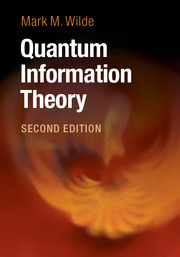Book contents
- Frontmatter
- Contents
- Preface to the Second Edition
- Preface to the First Edition
- How To Use This Book
- Part I Introduction
- Part II The Quantum Theory
- 3 The Noiseless Quantum Theory
- 4 The Noisy Quantum Theory
- 5 The Purified Quantum Theory
- Part III Unit Quantum Protocols
- Part IV Tools of Quantum Shannon Theory
- Part V Noiseless Quantum Shannon Theory
- Part VI Noisy Quantum Shannon Theory
- Appendix A Supplementary Results
- Appendix B Unique Linear Extension of a Quantum Physical Evolution
- References
- Index
3 - The Noiseless Quantum Theory
from Part II - The Quantum Theory
Published online by Cambridge University Press: 16 February 2017
- Frontmatter
- Contents
- Preface to the Second Edition
- Preface to the First Edition
- How To Use This Book
- Part I Introduction
- Part II The Quantum Theory
- 3 The Noiseless Quantum Theory
- 4 The Noisy Quantum Theory
- 5 The Purified Quantum Theory
- Part III Unit Quantum Protocols
- Part IV Tools of Quantum Shannon Theory
- Part V Noiseless Quantum Shannon Theory
- Part VI Noisy Quantum Shannon Theory
- Appendix A Supplementary Results
- Appendix B Unique Linear Extension of a Quantum Physical Evolution
- References
- Index
Summary
The simplest quantum system is the physical quantum bit or qubit. The qubit is a two-level quantum system—example qubit systems are the spin of an electron, the polarization of a photon, or a two-level atom with a ground state and an excited state. We do not worry too much about physical implementations in this chapter, but instead focus on the mathematical postulates of the quantum theory and operations that we can perform on qubits. From qubits we progress to a study of physical qudits. Qudits are quantum systems that have d levels and are an important generalization of qubits. Again, we do not discuss physical realizations of qudits.
Noise can affect quantum systems, and we must understand methods of modeling noise in the quantum theory because our ultimate aim is to construct schemes for protecting quantum systems against the detrimental effects of noise. In Chapter 1, we remarked on the different types of noise that occur in nature. The first, and perhaps more easily comprehensible type of noise, is that which is due to our lack of information about a given scenario. We observe this type of noise in a casino, with every shuffle of cards or toss of dice. These events are random, and the random variables of probability theory model them because the outcomes are unpredictable. This noise is the same as that in all classical information-processing systems.
On the other hand, the quantum theory features a fundamentally different type of noise. Quantum noise is inherent in nature and is not due to our lack of information, but is due rather to nature itself. An example of this type of noise is the “Heisenberg noise” that results from the uncertainty principle. If we know the momentum of a given particle from performing a precise measurement of it, then we know absolutely nothing about its position—a measurement of its position gives a random result. Similarly, if we know the rectilinear polarization of a photon by precisely measuring it, then a future measurement of its diagonal polarization will give a random result. It is important to keep the distinction clear between these two types of noise.
- Type
- Chapter
- Information
- Quantum Information Theory , pp. 53 - 100Publisher: Cambridge University PressPrint publication year: 2017

